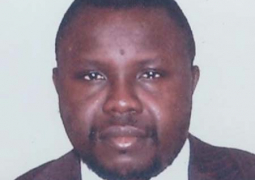
Justice
Kumba Sillah-Camara of the High Court in Banjul on 25 November, 2019, ruled in
favour of the prosecution in the case involving Yankuba Badjie and other former
NIA officers. This followed the application made by the prosecution for stay of
proceedings, pending the determination of two appeals filed by the defence at
the Court of Appeal against the rulings made by the judge.
Delivering
her ruling before the court, she said that the prosecution sought for an order
staying further proceedings of the case pending the determination of the
appeals filed by the defence, adding that the prosecution also sought other
orders that the court may deem proper to make.
She
stated that the defence counsel for the first accused/respondent filed an
affidavit in opposition on 17 October, 2019, sworn to by the respondent,
Yankuba Badjie, on 17 October, 2019.
She
noted that the prosecution/applicant raised two issues for determination by
asking whether the court had discretion to stay the proceedings in the light of
the two interlocutory appeals filed by the first accused; whether the two
interlocutory appeals filed by the first accused, when he would have testified
in his defence (unless specifically waived) and not having applied for a stay
of proceedings pending his appeal, it is open to him to object to the prosecution’s
application.
She
adduced that the defence/respondent also raised two issues for determination by
asking whether the applicant who had no appeals pending before the Court of
Appeal from the proceedings could apply for a stay of proceedings in the case
pending the determination of appeals that the applicant did not file. She said
that the defence also asked whether in the circumstance of the case and having
regard to the subsisting ruling of the court delivered on 7 October, 2019, the
application for stay of proceedings could be granted.
She
further said that the main submissions of the prosecution were that every court
of competent jurisdiction has the power and authority over and above its
statutory rules of procedure to regulate its proceedings; that one aspect of
such power and authority is a discretion to stop, stay, vary and adjourn for a
specific period or indefinitely the proceedings before it. That
notwithstanding, that stay of proceedings in criminal cases is not common, it
does not mean that it cannot be granted; that it is proper and appropriate to
do so, as a stay of proceedings in criminal cases can be made by a court in the
interest of substantial justice.
The
presiding judge further noted that the defence counsel for the first accused
submitted that the applicant who had no appeals pending before the Court of
Appeal in respect of the proceedings in the case could not apply for stay of
proceedings. At some point in time, she cited some authorities to support her
ruling.
“In
as much as the procedure looks weird or strange in the circumstances, the
bottom line is that there must be a competent appeal. The appeals are before
the Court of Appeal and it is very wrong for a court to decide at the
interlocutory stage issues to be determined in the substantive suit,” she
declared.
However,
she stated, in respect of the fact that the accused persons are charged
jointly, she agreed that if the matter was not stayed, then it would defeat the
justice of the case. “One of the appeals at the Court of Appeal deals with the
cross-examination of witnesses listed by the prosecution and not called. If the
Court of Appeal decides otherwise whilst some of the accused persons have
closed their cases before the determination of the appeals, the proceedings in
this case would be an exercise in futility. There would be recalling of
witnesses, reopening of the case etc,” she told the court.
The
ruling dated 7 October, 2019, she said, was very clear. She added that the
ruling had stated in part that “this court will proceed with the defence of the
other accused persons and since there is no stay…”
The
presiding judge told the court that there was no application for stay at the
time that ruling was delivered. She said that that was why the court indicated
that the matter should proceed. “The arguments proffered by the parties that
culminated in the ruling were not in respect of an application for stay but
that the first accused declined to proceed with his defence because he had
filed two interlocutory appeals. Therefore, this court cannot be stopped from
determining this application or granting same in the light of the ruling,” she
stated.
She
went on to say that it should be borne in mind that the application was for
stay of further proceedings which could only be wielded by the courts in
exceptional circumstances. She revealed that the prosecution had shown that it
would not be in the interest of justice if the matter proceeded since the
charges are jointly made.
“The
respondent filed the appeals and they would not be able to proceed with this
case in the trial court while on appeal and therefore, granting the application
would be more favourable to him than the applicant. It is an irony that this
application ought to have been made by the respondent/appellant but he did not.
I find it hard to believe that the reason for not doing so is not to forestall
the proceedings after filing two interlocutory appeals in the Court of Appeal.
The balance of convenience tilts in favour of both parties in this respect. The
respondent/appellant should not talk about delay because the delay culminated
from the appeals filed which must be heard and determined by the appellate
court of which this court is subordinate to and any decisions there from would bind this court,” the
presiding judge declared at length.
She
ordered that further proceedings of the case were stayed pending the
determination of the appeals filed by the defence, and that the respondent
should ensure that the appeals are expedited.




